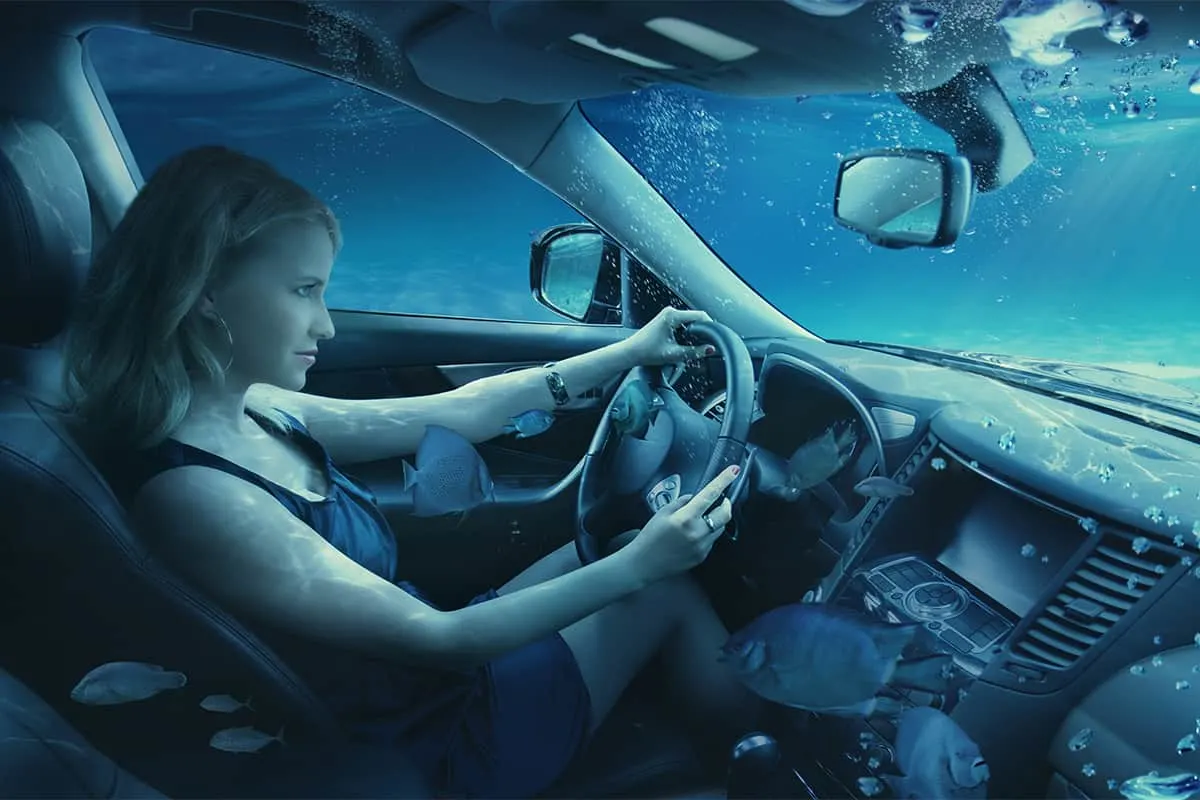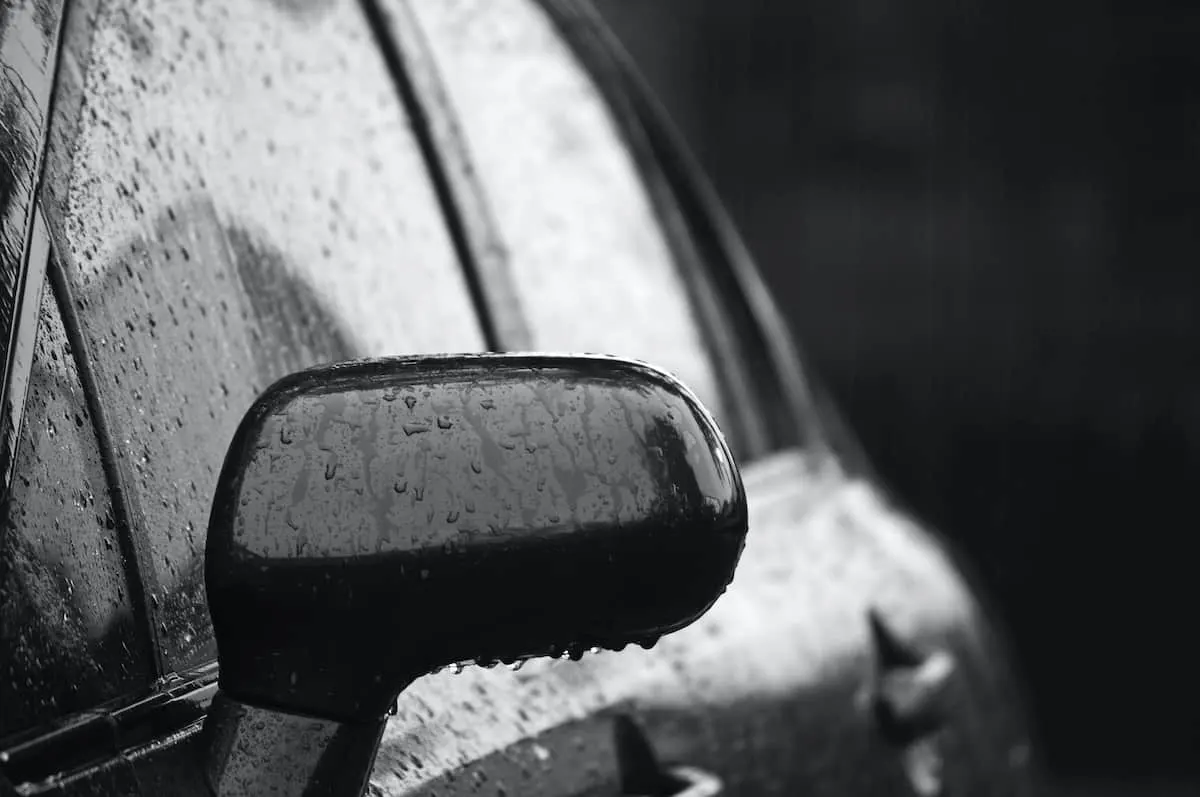Cars are made of metal, which might make them seem like they should be waterproof, but are they? We will look into this issue and find out if cars are truly waterproof.
Although cars are highly water-resistant, they are not completely waterproof. Cars will eventually fill with water if they are submerged, which will cause enough damage to destroy the vehicle if it is left in the water long enough.
If this was not the answer that you expected, you can learn more about why this is and why it matters. Read on to find all the information you need to know.
What Happens if a Car Goes Underwater?

If a car happens to go underwater, whether from an accident or a flood, areas like the windows and undercarriage of the car will eventually allow water to get into the car. The interior will get ruined if the water submerges the car for a long time, and the engine can get take damage.
The interior of the car will likely be soaked and could end up growing mold that will ruin the material on the seats, as well as the carpeting on the floor.
This will also affect all of the electronic systems in the car, like the radio controls and the automatic door locks.
For the engine, if enough water ends up inside it, the engine will begin hydro-locking. This is when water gets into the air intake.
The engine is made to compress air only, and water is too much for it to handle. This will make the engine stop altogether and ruin the usability of the car.
However, if it only goes underwater for a short amount of time and is dried off quickly, then you may still be able to salvage the engine and other parts of the car.
Can an Engine Run Underwater?
Although it may not seem possible, there are actually ways to waterproof your engine to allow you to run it underwater. However, this is not usual, and most cars do not come with waterproofing.
If your engine has not been waterproofed, then your engine will start to hydro-lock. Because the water is too much for the engine, the water will cause the engine to stop and lock.
If this happens, you will likely be unable to fix the issue. Also, it is much harder to waterproof a car’s engine as opposed to a diesel engine.
So, waterproofing is not a viable option for many vehicles.
How Deep Can a Car Go Underwater?
Even if a car is not waterproof, you will be able to take your car into the water to a certain point. This is not something that you should test but, in emergency situations, may cause you to have to drive in water sometimes.
This could be a big issue for areas that are prone to flooding and those that are hit by typhoons or tropical storms. However, how much water you drive through makes a difference!
Most vehicles will not be able to handle more than six inches of water. This is because, beyond that height, water could start getting into the exhaust and air intake.
As I mentioned before, water in the engine can make your engine stop completely, which will cause you to have no control over the vehicle.
This is dangerous for you and your passengers, but also for those around you. So, this should be avoided as much as possible.
If you are in an emergency situation, then it might be best to leave the vehicle before it hydro-locks, so you and your family can get out before it loses control.
Is it Bad to Get Water in Your Exhaust?
If the exhaust has just a bit of water in it, there may be a big difference. However, if your car is beginning to be submerged, then the exhaust can be a big problem!
If there is only a small amount of water, the gases in the exhaust can actually help push the water out. If the water keeps coming, then the water could get into the engine.
Once this happens, the problems that we’ve been discussing will harm your engine and stop the engine altogether.
The water will flood the engine and it will hydro-lock, which will ruin your engine.
So, if there is just a bit of water splashing into the exhaust, you will likely be fine. But, if there is a lot of water, then it can be very bad for water to get into your exhaust.
Why Are Some Cars Waterproofed?

There are a few select vehicles that do come with special waterproofing on the engine, but these are very few and far between.
Some vehicles that are made for military or police force use will come with waterproofing so when they are in a car chase, they will be able to go into the water if it is necessary to catch a criminal or enemy.
These vehicles are not used for everyday driving. And, because it can be expensive to get an engine waterproofed, not many vehicles have it unless it is necessary.
Most regular cars and sedans will not have to deal with any situation where they have to drive through water, so this is not done normally since it is not likely needed.

What Cars Are Waterproof?
Most cars are not waterproof, but there are some diesel engines that do come with waterproofing. However, because of the higher cost, even military and police vehicles do not all come with waterproofing.
This would cost a lot more money if all police and military vehicles were waterproofed, but it will also not be needed on certain cars that are made to be used in the desert.
So, certain cars that will be close to water or used for the most dangerous conditions will have waterproofing to prepare for the worst-case scenario.
Therefore, even the vehicles that are most likely to be used in water for rescues or criminal chases do not all come with waterproofing, so finding it on a regular vehicle is unusual.
Waterproofing For Rainstorms
If you are just looking for waterproofing for a small amount of water, like rain during a heavy storm, then you can do this by purchasing a waterproof cover for your vehicle.
This will help keep any water out of your car while the rain is pouring, and it is a cheap solution.
This is not waterproofing for your engine, but rather for the rest of the vehicle. This will protect your interior from water getting inside the crack between the window and the exterior, and it will help keep small rocks or pebbles from cracking your windows as the wind blows.
Sometimes, a small amount of waterproofing can make a big difference. Although this is not waterproofing that will allow your car to go underwater, it will help when the water comes down on your vehicle.
A Note on Safety
For those who like to test out how far they can take things, testing how much your car can take might be a temptation for you. However, speaking about the safety of trying to test your car’s ability to go underwater is highly unsafe.
Because the automatic parts of the car will shut off or lock, you may not be able to undo your seatbelt or open a window in time for you to get out. This could cause major damage to your brain if you are underwater for a long time, and it could even be fatal.
So, it is imperative that you take all the proper precautions, even in an emergency situation. You don’t want to attempt to do this only to be taken under the water with your vehicle.
Make sure that what you are about to do is completely necessary. One of the major reasons for someone to do this is because a family member or loved one is in danger.
However, if you can go into the water yourself in time to save them, then there is no reason to risk your life more than you already are going to.
So, take a moment to think about the consequences and decide if you can do something else to remedy the situation. If so, do it, and avoid driving your car underwater.
Conclusion: Are Cars Waterproof
Although cars are major machines that can handle a lot, they are simply not build to be able to go underwater. It can be very dangerous if you attempt to drive into the water, and you could likely lose the function of your car while risking your own injury or fatality.
However, if you are in just a little bit of water and are attempting to flee from an area that is flooding, you should make sure that you are not in more than six inches of water. If not, you will likely be able to drive your vehicle to dry land safely.
If you are stuck in over six inches of water, you might be better off finding another way to get to safety.
